

Post Covid19, nuove formule per l’ufficio. Le molteplici dimensioni sociali del cibo - Sociologicamente. Uber Eats’ Revamped App Aims to Make Restaurant Discoverability Easier. Uber Eats today unveiled a newly revamped app and website the delivery service says will improve restaurant discoverability.
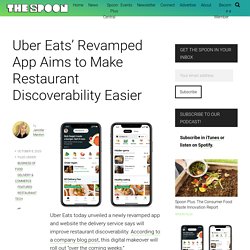
According to a company blog post, this digital makeover will roll out “over the coming weeks.” The revamp will include a number of new features, several of which are designed to make the process of finding one’s desired cuisine and restaurant faster. A shortcut toolbar will feature a user’s favorite cuisine types as well as quicker access to grocery stores, pet supply stores, flower shops, and other businesses that are relatively new to the third-party delivery space. These “discoverability” tools also include a feature Eats has dubbed Hidden Gems, which surfaces local restaurants in a user’s neighborhood and recommend restaurants based on past orders. Eating habits and lifestyle changes during COVID-19 lockdown: an Italian survey. This population-based study provides a snapshot of the eating habits and lifestyle of Italian residents, who participated in the survey between 5th and 24th of April 2020, after 7 weeks of lockdown.
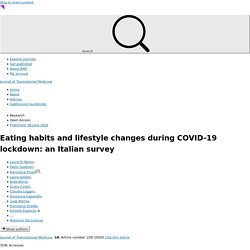
To our knowledge, this study was among one of the first to investigate the immediate impact of the COVID-19 lockdown on eating habits and lifestyle changes among Italian residents. The web-survey was concluded on 24th of April 2020 as it was the first day in Italy with the same number of newly infected and cured people. To that date, according to National Civil Protection Service data [36], the total number of assessed cases in Italy was 192,994: 106,527 people have tested positive; 60,498 patients have recovered; 25,969 died as confirmed only upon certification of cause of death by the Istituto Superiore di Sanità (ISS). An inadequate intake of Mediterranean foods exposes the whole population to specific oxidative damage [28], and, thus, to susceptibility to COVID-19. 3D printed support frame eases breathing through neck tubes. Kazunori takeishi from japanese design atelier monocircus has introduced ‘lacunal’, a 3-dimensional support frame to ease breathing when wearing a neck tube or a buff. lacunal is named after ‘lacuna’ which refers to an empty space or gap and it can be used while running, trekking or performing any other athletic activity. the item is made via 3D printing laser sintering technology, and can be customized to fit individual facial sizes. lacunal creates a space between the neck tube and the mouth to ease breathing all images courtesy of monocircus.
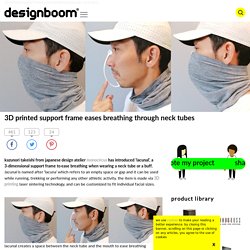
Offices will balance physical and virtual work says Perkins and Will director. Offices after coronavirus should be designed for meetings and socialising while focused work should take place at home, says Perkins and Will interior designer Meena Krenek, who has developed proposals to rethink the purpose of the workplace.

Krenek, who is interior design director in the architecture firm's Los Angeles office, led a team to create the conceptual Meeting Space project in response to the coronavirus pandemic, which she said has seen many companies enjoy the advantages of working from home. "Does the traditional one-workstation-per-person ratio still make sense? " Corona-Pandemie: So überstehen Nike und Adidas die Krise. Black sheep restaurants sop covid19. 10 Micro Hotels Challenging the Status Quo of Travel. View in gallery Travel has gotten needlessly complicated over the decades.
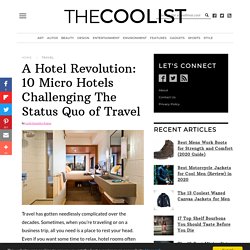
Sometimes, when you’re traveling or on a business trip, all you need is a place to rest your head. Even if you want some time to relax, hotel rooms often have more wasted space than used space. So hoteliers are getting smart. They’re building small, functional and visually exciting rooms that provide a big experience in a compact space. - The Washington Post. Wohnungsbaugenossenschaften. Kitchen Sharing – CIBO ARCHITETTURA. Scenarios Beyond COVID-19: Rebound, Reboot, Reinvent – Nielsen. Governments around the world are edging toward plans to exit mass population lockdowns, albeit at different speeds and in different ways, but the persistent questions for business are around what the future holds and how it should be navigated.
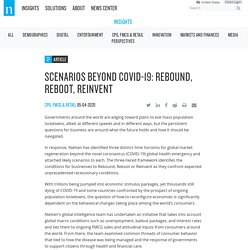
In response, Nielsen has identified three distinct time horizons for global market regeneration beyond the novel coronavirus (COVID-19) global health emergency and attached likely scenarios to each. Covid Innovations. Contactless Dining Kit - Presto. A Grocery Store Inside A Restaurant? Perhaps The New Reality Of A Post-Coronavirus World. Most restaurants in the U.S. have been shut down for weeks, some for months, and there is speculation that a good percentage may never open again.
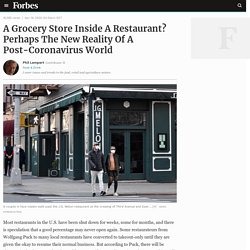
Quick-service restaurants in coronavirus times. With much of the world’s population being asked or required to stay home and follow physical-distancing guidelines, once-bustling restaurants and cafés now sit empty.

Although a few quick-service restaurants (QSRs) are seeing heightened demand in takeout and delivery—several US pizza chains, for instance, are hiring thousands of workers as orders spike—most other QSRs have experienced dramatic sales declines. Some have closed their doors for good. The coronavirus pandemic is a humanitarian crisis whose economic impact will almost certainly be severe as well. As our colleagues wrote in a recent article, “The required ‘lockdowns’ of the population and other efforts to control the virus are likely to lead to the largest quarterly decline in economic activity since 1933.” They expect an unprecedented 40 to 50 percent decline in discretionary spending—a roughly 10 percent reduction in GDP.
The QSR industry has been hit particularly hard. COVID-19’s impact on consumer behavior. Restaurant Marketing Ideas During Coronavirus. Coronavirus business impact: Restaurants are converting their spaces into retail stores to ride out the pandemic. Ki Cordless Kitchen Standard. <strong>We're sorry but wpc doesn't work properly without JavaScript enabled.

Please enable it to continue. </strong> The emerging Ki Cordless Kitchen standard builds on the success of the Qi standard for wireless charging of mobile devices. From mind to design in minutes. Assorted glassware - Decorative objects - ALL ORIGINE - Glass. Yahoo fait désormais partie de Verizon Media. On a sunny Seattle morning in early October, 620 people streamed into a waterfront conference center.
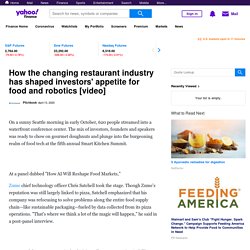
The mix of investors, founders and speakers was ready to chow on gourmet doughnuts and plunge into the burgeoning realm of food tech at the fifth annual Smart Kitchen Summit. At a panel dubbed "How AI Will Reshape Food Markets," Zume chief technology officer Chris Satchell took the stage. Though Zume's reputation was still largely linked to pizza, Satchell emphasized that his company was refocusing to solve problems along the entire food supply chain—like sustainable packaging—fueled by data collected from its pizza operations.
Camtasia 2019 for Mac Essential Training - Creating videos with Camtasia. The coronavirus pandemic could threaten global food supply, UN warns. The issue, however, is not food scarcity -- at least, not yet. Rather, it's the world's drastic measures in response to the virus. Border closures, movement restrictions, and disruptions in the shipping and aviation industries have made it harder to continue food production and transport goods internationally -- placing countries with few alternative food sources at high risk. Heightened instability in global food supply will affect the poorest citizens most, warned the UN's Committee on World Food Security (CFS) in a paper last month. Even private companies and organizations have called for immediate action to address the looming food catastrophe.
"Governments, businesses, civil society and international agencies need to take urgent, coordinated action to prevent the COVID pandemic turning into a global food and humanitarian crisis," said an open letter to world leaders from scientists, politicians, and companies like Nestle and Unilever. #remotefuture20 - Zukunft hat sich radikal geändert 18.03.2020 mit Harry Gatterer und Florian Kondert. The Future European Design Action Plan. Text by Dr Anna Whicher; re-published from BEDA News “It isn’t about what Europe can do for design but what design can do for Europe.” Within the European Commission’s renewed Industrial Policy there are six top-level priorities: Single Market, Digitalisation, Circular Economy, Sustainable Investment, Innovation and Europe’s International Role. At our Insight Forum event to mark BEDA’s 50th Anniversary, BEDA members and stakeholders explored concrete ways in which design could contribute to these priorities in the hope that we may have another Commission endorsed Design Action Plan.
COVID-19: come stanno cambiando gli stili di vita e i consumi degli italiani. How to navigate external shocks like COVID-19 and come out on top. The content you requested is only available to registered users. By completing and submitting the form you will register as a user. GfK is committed to protecting and respecting your privacy. GfK processes your personal data to improve the quality of our services and to keep them secure. Based on the interests you have shown by registering for this and other content, GfK may contact you in a direct and responsible manner to establish a business relationship.
Moody’s: Food processing, packaging largely resilient in the face of COVID-19. A heatmap of the economic impact of the coronavirus on North American industries shows low exposure for food and beverage processing, and packaging, among others. Business and financial services company Moody’s has released a report in which it provides a heatmap of the level to which North American industries will be economically affected by the coronavirus pandemic. Among those identified as having Low Exposure—in both Moody’s baseline and downside scenarios—are food and beverage, packaging, telecommunications, and waste management, all of which provide essential goods and services.
Grocery stores, for example, have remained open even in heavily-restricted containment zones in Italy, China, and the U.S., notes the report. How eCommerce is adapting and reacting to the coronavirus. Key Consumer Behavior Thresholds Identified as the Coronavirus Outbreak Evolves – Nielsen. A Nielsen investigation has identified six key consumer behavior threshold levels that tie directly to concerns around the novel coronavirus (COVID-19) outbreak. The thresholds offer early signals of spending patterns, particularly for emergency pantry items and health supplies, and we are seeing these patterns being mirrored across multiple markets.
Correlating COVID-19 news events, such as public health announcements and government press conferences with consumer spending on items such as hand sanitizers and shelf-stable foods, reveals a series of recurring patterns. These patterns (though still evolving), when reviewed across impacted countries, help provide a set of leading indicators for packaged goods manufacturers and retailers faced with supply issues as they race to meet record levels of demand and changing purchase habits. Interested in More COVID-19 Consumer Insights?